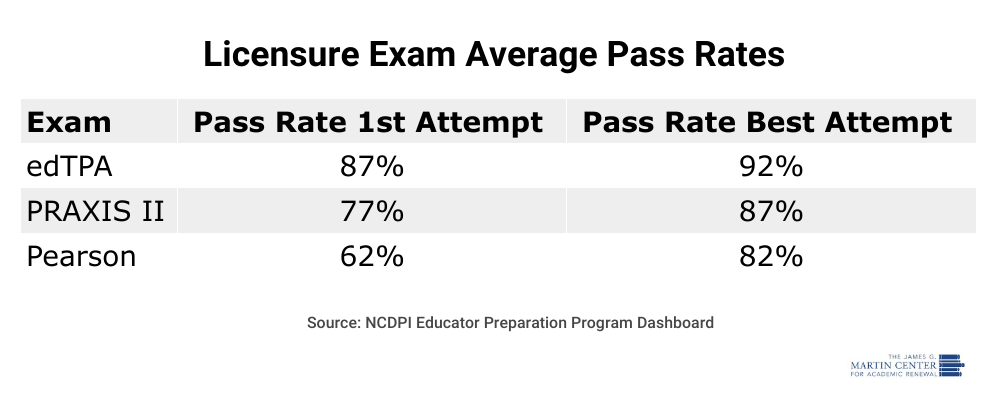North Carolina is facing a teacher shortage. The state is struggling to produce enough teachers for its K-12 schools and is currently relying heavily on substitute teachers to fill the gaps. This in turn puts pressure on the state’s colleges and universities to boost enrollment in education programs with the hope that graduates will stay and teach in North Carolina. How can the state go about resolving this issue? Some think that adjusting the teacher-licensure process is the solution.
Back in February 2022, the North Carolina Association of Colleges for Teacher Education (NCACTE) proposed “removing [the] Praxis core [exams] as a requirement to enrolling” in an educator preparation program (EPP). It also called for “removing the licensure exam requirement … for educators who have completed [such a] program.”
NCACTE’s proposal would eliminate the exams used to determine whether a candidate is qualified to teach.Currently, teacher candidates in North Carolina are required to take an entrance exam prior to enrolling in an EPP. Upon completing their studies, they must take their licensure exams within three years in order to obtain a continuing professional license (CPL). During that three-year period, teacher candidates may begin teaching with an initial professional license (IPL) while they prepare for their licensing exams.
Thus, NCACTE’s proposal would remove the exam that is currently used to determine whether a teacher candidate is prepared for teacher training. It would also eliminate the exam that is currently used to determine whether a candidate is qualified to teach in a classroom post-graduation. Why are education “experts” so adamant about removing these exams? The answer is unsurprising. NCACTE’s proposal is a thinly veiled attempt to manipulate the playing field for the sake of diversity.
NCACTE recently explained its concerns about standardized tests, stating, “Entry and licensure exams serve as barriers to placing more teachers, particularly more diverse teachers, in classrooms.” In other words, NCACTE doesn’t believe that its “diverse” teacher candidates can succeed when faced with objective measures of preparedness. Reading this argument, it is difficult to avoid being reminded of a phrase popularized by George W. Bush: “’the soft bigotry of low expectations.”
The North Carolina Department of Public Instruction’s (NCDPI) Educator Preparation Program Dashboard contains a wealth of information about North Carolina’s EPP programs. Of specific interest are the data concerning licensure exam results from the last several years.
NCDPI’s dashboard contains aggregated score information for the Pearson, PRAXIS II, edTPA, and PPAT exams. However, NCACTE makes clear in their proposal that edTPA and PPAT are less like standardized tests and are better understood as “comprehensive, portfolio-based assessments created over the course of several weeks or months.”
While these two “assessments” would no longer be required under its proposal, NCACTE does suggest that EPPs may wish to incorporate them as part of their programs, as “edTPA/PPAT provide valid and reliable data on candidate performance.”
That NCACTE wants to scrap these measurements speaks to a deep lack of confidence in North Carolina’s education programs.It would seem, then, that the edTPA/PPAT exams (assessments) and the Pearson/PRAXIS II exams (standardized tests) are intended for different purposes. One set of tests measures candidates’ ability to create subjectively-graded “portfolios,” while the other measures objective learning. By undertaking both sets of tests in tandem, candidates are able to show a wealth of knowledge in different ways. That NCACTE wants to scrap the objective measurements speaks to a deep lack of confidence in North Carolina’s education programs and teacher candidates.
Upon reviewing NCDPI’s data, it appears that teacher candidates seem to perform well on the subjective edTPA test. (PPAT, unfortunately, has minimal data at present). From 2019-2022, edTPA test-takers achieved an overall pass-rate of 87 percent on their first attempt and 92 percent on their best attempt. Takers of the objective PRAXIS II test fell slightly below that mark from 2014-2022, with a 77 percent first-attempt pass-rate and an 87 percent best-attempt pass-rate. Pearson scores were the worst, with pass-rates of 62 percent (first attempt) and 82 percent (best attempt) from 2014-2022.

If anything, student underperformance on the more objective measures of learning suggests that some teacher candidates have not been well-prepared by their college education programs. This points directly at the quality of education being achieved at North Carolina’s EPPs.
Yet, as previously mentioned, NCACTE’s proposal to do away with standardized testing for teacher candidates is not only about overall student performance. Rather, it is about “diversity.” When one disaggregates the score data for each exam on the basis of race/ethnicity, it becomes clear that a few groups have fallen behind in pass-rates. Both Pearson and PRAXIS II data show that American Indian/Alaska Native and black candidates have lower passing rates on their first and best attempts than do other ethnic groups. Meanwhile, Asian and white candidates top the board on each exam type.



As these data show, the tests in question do appear to have a “disparate impact” on some minority students. Nevertheless, the exams are nowhere near insurmountable enough to justify their elimination. Yes, some people struggle more than others, but that could be the result of many factors (for example, program-student “mismatch”), thereby making it illogical to simply blame the exams.
Let’s not forget, too, that candidates get three years to take and pass these exams. And as the dashboard makes clear, 84 percent of the candidates who pass the exams pass them on their first attempt. The success percentage increases for every subsequent exam attempt.
Standardized exams are effective in part because of the barrier they create.Standardized exams are effective in part because of the barrier they create. By putting in the effort that it takes to pass such exams, students prove their knowledge. If they fail, then the barrier to entry remains, separating those who are determined to push through to success from those who are not.
NCACTE has argued publicly that North Carolina should maintain high “standards for teacher preparation” in order to ensure that teachers are well prepared for the classroom. The irony is palpable. In the same breath that NCACTE expresses concern about producing high-quality teachers and maintaining high standards, it argues for taking away perhaps the most useful tool for determining if teacher candidates are prepared for the responsibility of teaching in the classroom. It’s difficult to understand how these two sentiments can coexist.
Without standardized tests, North Carolina’s teacher-licensure process would rely exclusively on EPPs to prepare and test teacher candidates. But why rely on one preparation method when you can boost candidates’ chances of success by implementing multiple tools to test their knowledge?
The Martin Center has often made a similar argument in support of the use of SAT/ACT scores and GPA in college admissions: Two methods are better than one. Standardized tests are likely even more necessary in this case, however, as teacher-education candidates will ultimately be teaching younger generations.
The Martin Center has attempted to contact NCACTE to learn the current status of their recommendations; however, the organization didn’t provide a quote in time for publication. At this time, it doesn’t appear that the recommendations in question have gained much or any traction. While this is currently to the benefit of future N.C. teachers and K-12 students, it doesn’t mean we’re out of the woods.
Indeed, it’s becoming increasingly popular to advocate for the lowering of standards at colleges and universities under the guise of increasing diversity and inclusion. But it’s important to acknowledge that these standards were implemented for a reason. Parents want the best quality education for their children, whether in K-12 or higher ed. Let’s not be fooled into believing that that can be achieved by eliminating all barriers to entry.
Ashlynn Warta is the state reporter for the James G. Martin Center for Academic Renewal.

